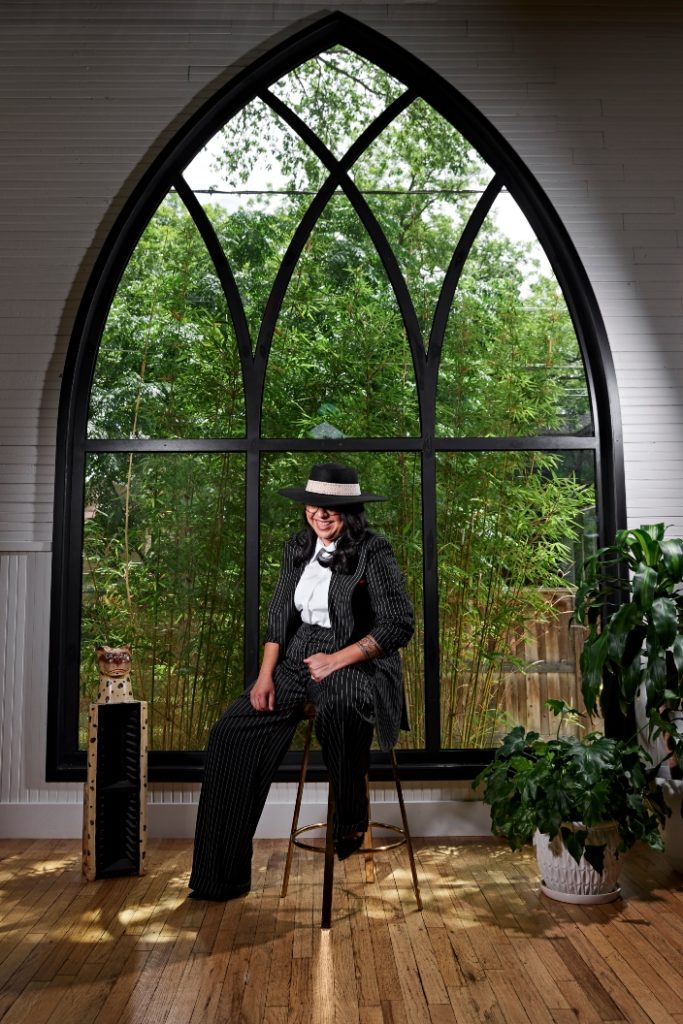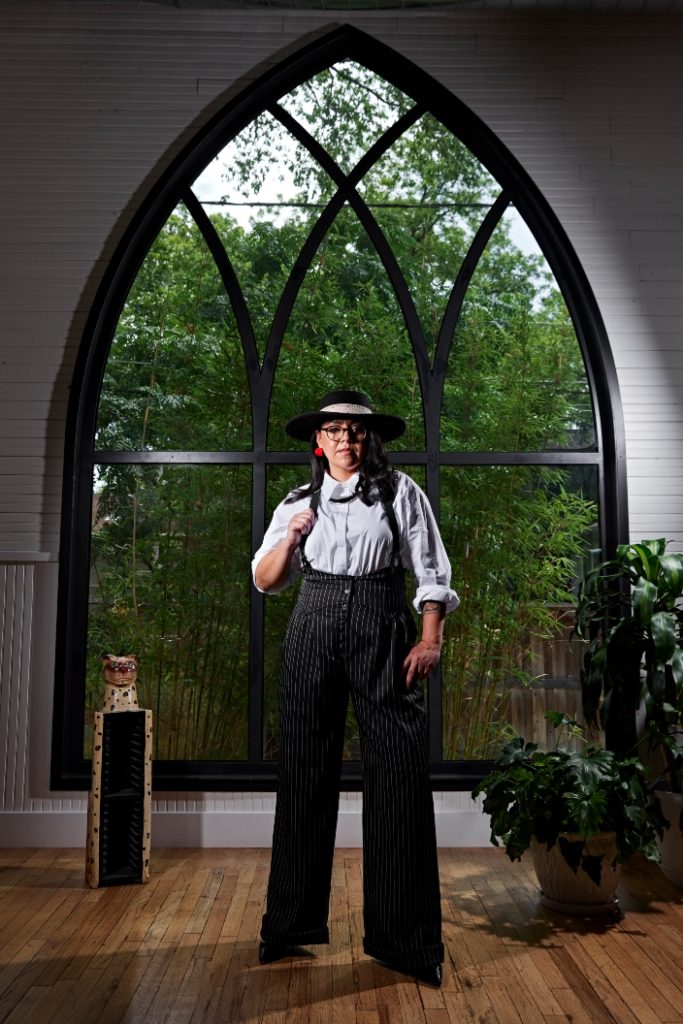Travis County Judge-elect Denise Hernández has defied expectations all her life.
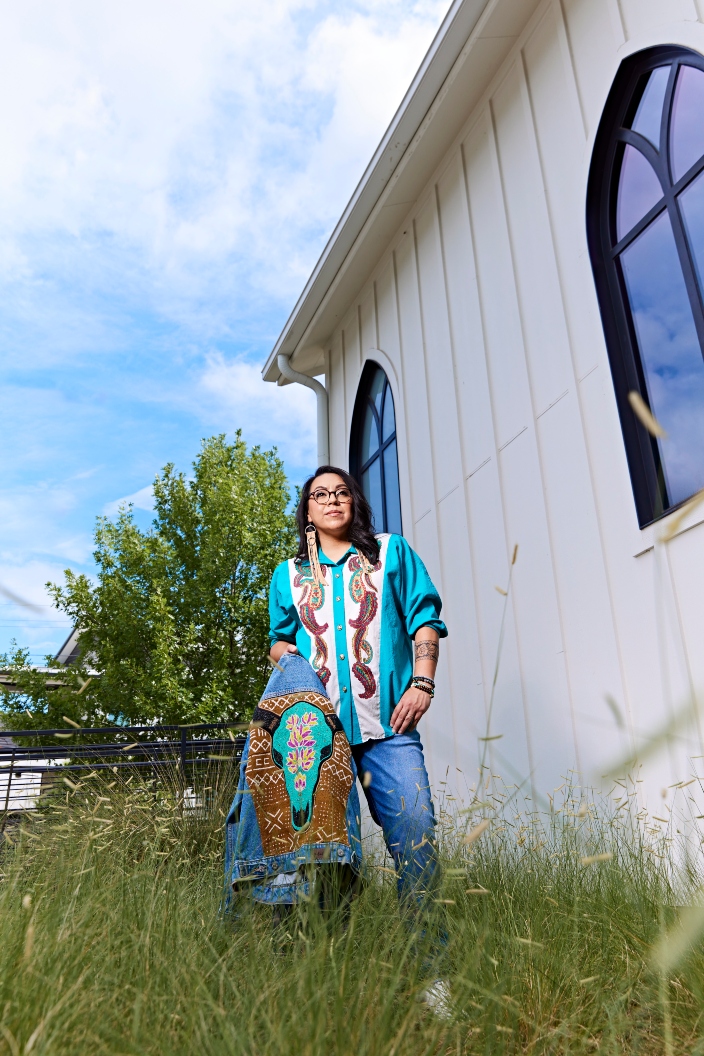
By Cy White; Photos by Annie Ray; Styling by Parke Ballantine with inspiration from Revival Vintage, Diana Boch Designs, Pink and Silver Fashion and Hex Panther; Hair and makeup by Valerie Lopez; Shot on location at The Cathedral
An unassuming woman emerges from the sublevel of The Cathedral. The air is instantly sucked out of the room. She’s an absolute stunner. Oversized waist-high black zoot suit pants held up by suspenders. White tucked-in button-up, matching zoot suit jacket and a wide-brimmed black hat. She makes her way to one of the building’s signature arched floor-to-ceiling windows, perches atop a golden stool and waits, hand in pocket, sleeves rolled up, forearm tattoo on full display. She exudes authority, confidence.
A couple months ago, this same woman sat in the newly decorated home office her wife helped her put together, wearing an old T-shirt, no makeup, hair laying straight and flat at her shoulders, and spoke about how teachers pegged her as a “gangster” in elementary school.
Ladies and gentlemen, meet Judge-elect of Travis County Denise Hernández.
Subverting Labels
Denise Hernández is used to people making assumptions about who she is based on labels society has assigned her. Low-income daughter of migrant farmers. Latina woman. Lesbian wife. It’s like a word-association game. And everyone reading has an image in their heads of what each of these words means.
Since elementary school, she’s had to fight against the cliches people attached to her. For Hernández, it was more than just a need to define herself; it was an act of survival to keep her from a fate many BIPOC children, unfortunately, aren’t able to avoid. The world has consistently tossed them into a bin to be neglected and later thrown away.
“I moved around a lot as a kid,” she begins. “My parents divorced at a very young age. My dad was around and was a supportive parent, as much as he could be, for everything he was experiencing at that time, [but]it was mainly just my mom raising us. It was difficult. She was working two or three jobs a majority of my childhood to provide for me and my little sister.”
A common thread among many low-income families is the need to move around from place to place. Finding homes that fit within tight budgets. Often that leads to environments lacking in safety and opportunity. “Off the top of my head, I think I attended four or five different elementary schools,” she says. However, life changed in unexpected ways for Hernández when she entered fifth grade. Her family was able to attain assisted housing in a decent school district. With that came the alien feeling of being the only Brown face in a sea of white.
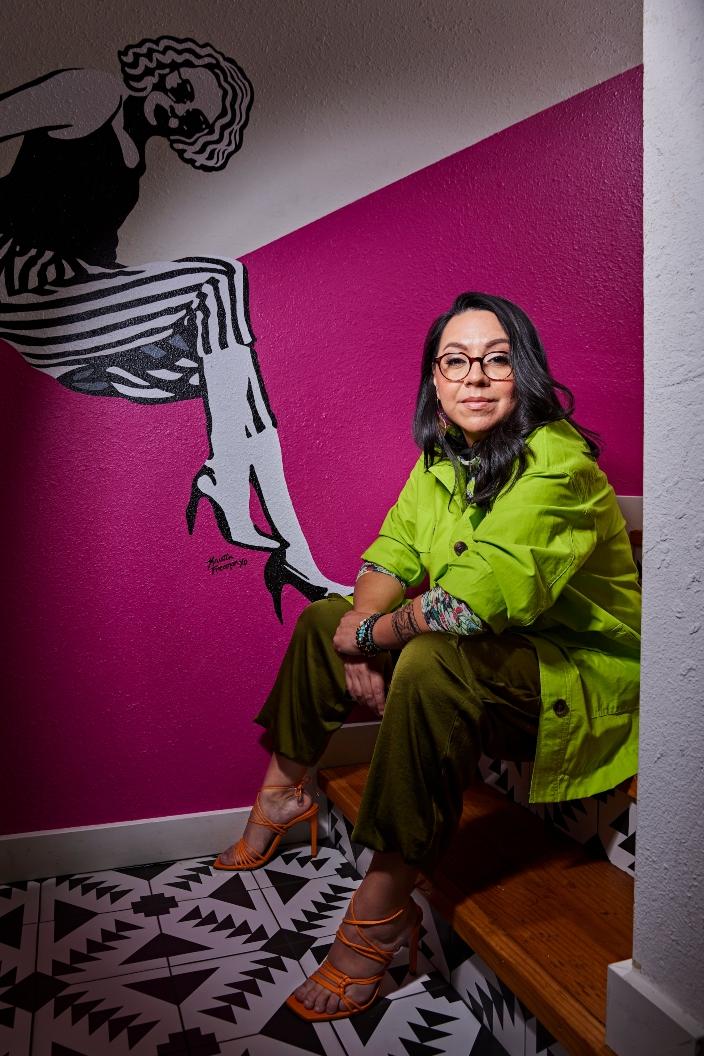
“I was in a significantly different socio-economic class. The first time I realized that my teachers viewed me kind of as a bad student is when I started at this elementary school,” she says. The crease at her brow indicates the pain of that realization still stings. “There was a claim that I had brought a knife to school, which I hadn’t. But there were just all these images and thoughts about me as I attended this new school by the teachers. Assumptions, biases about who I was. Those biases came through in how they treated me.”
She pauses, a small smirk crossing her face as her gaze wanders, the shadow of a hurtful memory clouding her eyes. “It’s crazy,” she says, the words coming on the back of a chuckle. “This memory feels like just yesterday. There was an issue at the time in elementary school where students were marking on walls in the bathroom. I had gone to the bathroom. [When] I came out, a teacher accused me of putting graffiti on the wall. This was the same teacher who was repetitively getting me in trouble.
“My mom held a parent-teacher conference with this teacher and confronted her on some of these things. The teacher repetitively said, ‘Your child is a little gangster and is a troublemaker,’ accusing me of all these things that I had not done. When you hear that so often, and when you’re new to a school, at such a young age, you really begin to believe, ‘Maybe I am just a bad student,’ right?”
This pattern of unfair judgment fed into middle school, where she continued to find herself a victim of her teachers’ ire. “With that, I felt like I was embodying what I thought people told me I was. I was hanging out with students who were doing drugs at a very young age. Though I was too terrified of my mother to ever participate, I was still hanging out with a crowd that was experiencing, now that I reflect, a lot of trauma in their own lives, experiencing a lot of the same things I was experiencing.”
The story pours out of Hernández. As if she’s trying to purge the lingering pain of teachers seemingly set on making an example of her. It’s not an uncommon experience, especially for brown-skinned youth from low-income families. Becoming the target of overworked and underpaid teachers who are ill-equipped (or unwilling) to really consider each student for who they are and what they’re going through.
“I was blessed enough that I never got involved with law enforcement,” she says. “But I was experiencing the school-to-prison pipeline…[at]like, 10, 11 [years old], began to get in-school suspension for small things like talking in class. Just navigating that was really—”
She pauses. Adjusting her glasses, then after about two seconds, “It was a painful time for me, for sure. At the same time, carrying a lot of weight from your family. My dad’s an immigrant, and no one in my family had gone to college. So there’s a lot of pressure, even in the fifth grade, to do well in school. You have these conflicting notions of what you can and can’t do. Your parents say you can do this. But then you spend so much time with teachers, and they’re telling you that you’re a bad kid. It was…it was a hard time, but it was a time that I feel really shaped me.”
Two Choices
Though her experience with authority wasn’t exactly positive in many cases, it was an older school administrator that hit Hernández with the very real possibility that she could be another statistic in a system ready to chew her up and spit her out.
“I remember that I got in trouble at school. The principal said, ‘You know, Denise, you’re heading down a really bad path, and people are paying attention to your actions. There’s two things you can do. You can continue on this path. Or you can be a leader in a positive way and influence positive change.’
“No one had ever talked to me in a way that said, ‘Hey, you could do something good,’ you know? If it wasn’t for that principal, making a decision not to send me to in-school suspension, but having a real conversation with me, I don’t know how my life would have ended.
“I was essentially serving as a second parent in my household. Taking care of my little sister when my mom was working these two to three jobs, on top of understanding at a very early age what poverty is. Then also just navigating the weird dynamic between my parents at that time. There was a lot of trauma,” she admits.
But that single moment of someone really seeing past the facade, tearing down the wall to get to the real Denise Hernández, shifted her understanding of who she was.
“The image in my head of myself, before that point, was very much the image of what that teacher was telling me,” she admits. “After that [conversation], I really shifted my perspective. That’s when I got involved with the nonprofit that eventually changed my life. The National Hispanic Institute. I really just began to see myself differently.”
From there, Hernández understood her calling as that positive motivating force for children and teens; to show them they are more than what the world around them says they are.
“To me, that goes to a deeper issue of how so many Black and Brown students in school are getting in trouble for ‘behavioral issues’; are labeled as ‘bad students,’ and no one’s taking the time to really get to know what’s happening. I think that’s why I find mentorship so important. You’re really giving the individual time to share their story. But you’re also getting to learn your mentee and what they’re experiencing. Sharing tools, processing conflict and processing their own trauma and just showing them a path that helped you along the way and hoping it provides them a similar path of healing.”
Taking the Law Into Her Own Hands
With as tumultuous a relationship with authority figures as Hernández had, one could be forgiven for disbelieving that she ultimately chose law as her career. Certainly, the relations between law enforcement and communities of color are strained at best. Hernández has been open about her own family’s history with law enforcement and immigration authorities. Namely that the majority of the men in her family have experienced incarceration in some way.
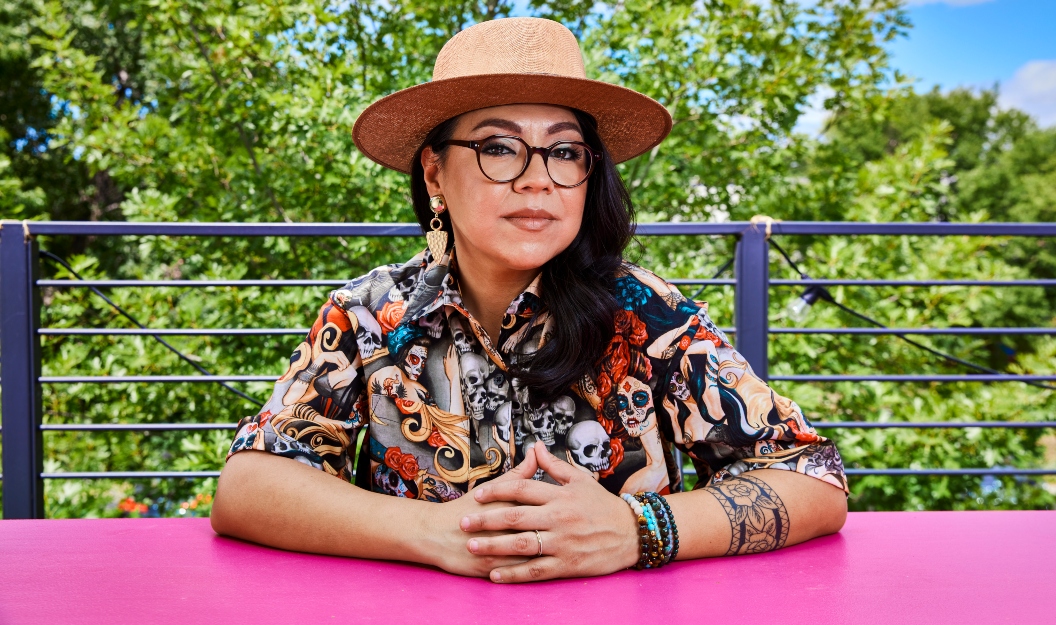
As the daughter of migrant farmworkers, Hernández is no stranger to the strain of attempting to survive while navigating structures meant to keep a migrant working class from crawling out of forced destitution. “I have a very distinct memory of my mom’s dad,” she says. “We went to go visit him while he was in prison, and I just remember feeling so much anger that he was there and that we were visiting him like that. Then I watched my dad navigate the criminal justice system. At a very young age, I knew about the law, and I saw how it impacted my family in a negative way.”
However, Hernández is solutions minded. Crying about the things she believes she can’t change is never an option. Her first real encounter with a courtroom, in fact, was fighting for her mother and their family to keep them from eviction…at 15 years old.
“We were living in a home that didn’t have working plumbing,” she recalls. “I remember thinking, ‘This isn’t right that we’re living in this house that doesn’t have working toilets for over a month.’ At the same time, my mom’s paying to get that fixed and unable to make rent. My mom, though she is very outspoken in community settings, when it comes to legal settings or structures like that, she’s very timid. I think that has a lot to do with the power dynamics at play in a court system for a Brown woman.
“I took it upon myself to go research the property code. Searched ‘broken toilets, evictions,’ which popped up a bunch of information on tenants rights and led me to the property code. I found a section that says your landlord has these obligations, including making sure they provide you with a clean unit that has working water. I remember telling my mom this and her being like, ‘Mija, no, we’re not going to bring this up,’ [even]though it was a valid point.” She becomes animated, transported back to that moment when she knew she could do something to defend the woman who’d raised her and her sister on love and sheer iron will.
Hernández inherited that iron will. Combined with her thirst for justice, she fought on her mother’s behalf. “I told my mom, ‘I’m gonna go with you to this eviction proceeding.’ And I’m young; I’m like, 14, 15 years old,” she says with a laugh. Though not too keen on hearing the case from the mouth of a 15-year-old girl, the judge did grant Hernández’s mother an extension.
“It was a moment that I realized there is an issue in our justice system,” Hernández says. “Overall, not just criminal, civil as well. Where people who are low-income, who are Black and Brown are easily intimidated in these spaces. They don’t know their rights, and they sometimes don’t have advocates. I began to see it as something I could navigate to help people like my family. [It] was around the same time that I’m having that conversation with that principal. All these things are happening around a close timeframe, where I’m seeing the connection of good I can do by advocating for my mom in this legal space and seeing that I could do that as a lawyer for a lot of people.”
What began as the need to defend her mother became a lifelong obsession with justice. While involved with the National Hispanic Institute, Hernández honed her public-speaking skills through the mock trial and speech and debate teams. “God bless my mom,” she says. “One thing I can say about my mom: I would ask, and she wouldn’t say no.”
Through careful planning, a strong community of mentors around her and her mother’s devotion to her child’s dreams, Hernández carried her enthusiasm into high school. “This is kind of where the shift happened,” she says. “I ran for student council; I was class president. It helped me see that community service, public service was a passion of mine. It was like 2004, 2005, the immigration reform walkouts were happening. A bunch of students had walked out of school, and I helped organize one of those protests. I also helped organize what to do after the protests. How do we engage with our public officials to advocate on our behalf?”
When she made her way to college, Hernández fully committed to this life of service, mentorship and advocacy for those often forced but unable to advocate for themselves. She was accepted to the University of Incarnate Word in San Antonio on scholarship. There she continued debating and her involvement with student government. “[It’s] the [cycle]of giving back what’s given to you,” she says. “I was mentoring first-generation college students in college, and then in law school, I was mentoring high school students interested in entering the legal field, constantly finding ways for me to give back to my community wherever I lived.”
Denise and Krista: Everlasting Love
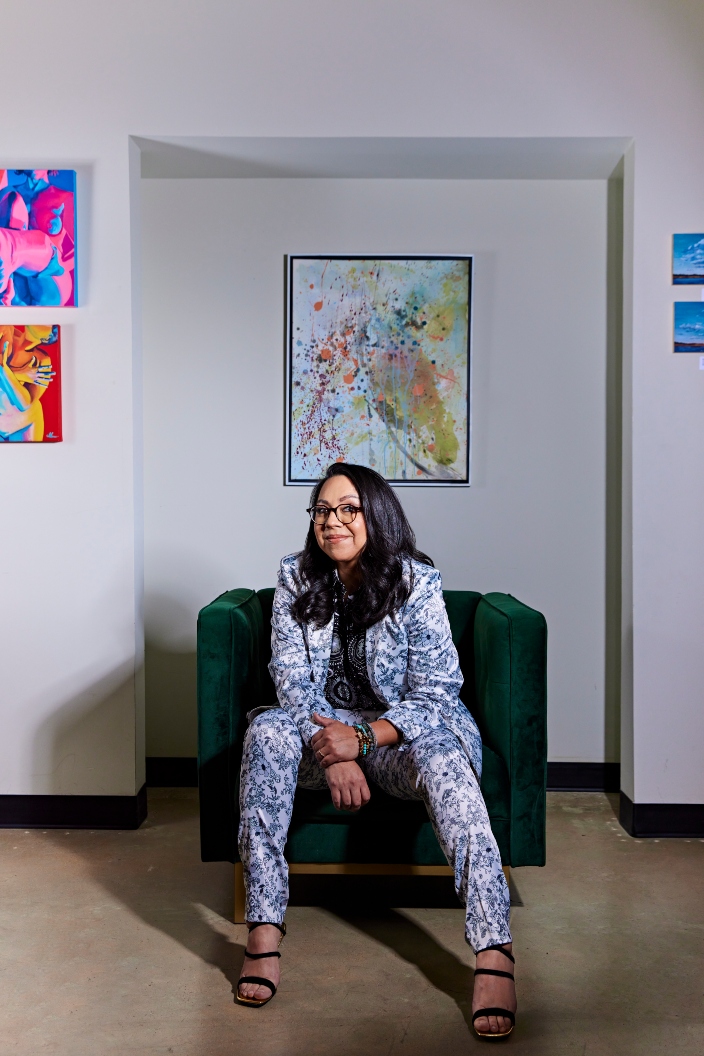
Moving to Lubbock, Texas, to attend Texas Tech University of Law proved a bit of a “culture shock” for Hernández. Despite going to mostly predominantly white schools from middle school to college, Houston and San Antonio are by and large diverse communities. Lubbock, a little less so. It proved to be one of the more harrowing experiences for Hernández, confronting the most overt and aggressive racism she had in her life up to that point.
“You feel it,” she says. “When I moved to Lubbock, my school was not diverse, my town was not diverse. It was really hard on my mentality. It was the first time I experienced direct racism. I was called a ‘beaner’ in Lubbock. Told to go back to Mexico in Lubbock. But I met my wife in Lubbock. So, you know, that’s a positive.” No matter what stain Lubbock left on her mentally, the mention of her wife brings a wistful smile to her face, instantly clearing the murky thoughts of that experience from her countenance.
Denise’s wife, Krista Hernández, is omnipresent. At the photoshoot, she’s in every pose, “smize,” even in every exclamation at a piece of art on the walls. With every look Denise dons, one could witness her sending her wife selfies from multiple angles. Almost instantly, Krista would respond with a, “You look amazing,” or “How much does that one cost? Because you need to wear that again.” In fact, Denise proclaims during a shot in the stairwell, “[Krista]’s so hot, I’ve got to try to do my best.” Star-crossed lovers, as the phrase goes.
“I’m sure Denise has already charmed you with her joke about writing a country song about two lesbians finding love in Lubbock, Texas,” Krista says with a laugh. “We met while going to Texas Tech. We had a shared experience of stepping into Lubbock and feeling this overwhelming culture shock. The lack of diversity was jarring. It also smelled like cow manure, and we had to endure these intense sandstorms, which didn’t help the overall feeling of, ‘Wtf am I doing here?’”
Through the initial gut-punch of being in an oftentimes hostile environment, Krista found her tribe, and Denise found Krista. “We were at a party together, and I was talking about a breakup I went through with another woman,” Krista reveals. “Denise realized I liked women and laser-focused on me. She wasn’t out just yet. I’m not even sure if she had a full grasp on her sexuality; she just knew she was attracted to me, and she made the first move. She didn’t know what would happen, but she knew what she wanted to happen, so she jumped right in to make it happen.
“We connected immediately,” Krista continues. “She’s magnetic; I was drawn to her. I’m an introvert and not nearly as good at people as Denise is. She actually taught me a lot about human connection and the importance of community. After that first night, we started texting and would literally stay up all night talking to each other. It was so easy. Looking back, it makes complete sense now because she’s my wife and my favorite person, and of course it was easy to talk to her from day one.”
Justice in the Sangre
This instant connection culminated in more than a powerful, lifelong romance. The couple has a passion for mentorship and advocacy, particularly for queer Black and Brown folx. It’s love, plain and simple. A desire to make sure those around them are cared for without question.
Denise’s advocacy work is well documented. Though her initial goal to practice nonprofit law fell to the wayside promptly after she started practicing regularly, the nonprofit spirit never left her.
“I spent most of college and my law school summers working at nonprofits,” she says. “I interned at the Chicago legal aid services, the Texas RioGrande Legal Aid, the Texas Civil Rights Project. Any nonprofit that I could work with that was doing civil rights work or criminal justice work, I was there.”
After receiving an offer for a job at the Legal Aid Society of Lubbock, Denise strapped in for a journey she could’ve never imagined as a kid singled out by a vindictive elementary school teacher.
“My position was part-time work with people who were experiencing eviction or divorce and so on. Then the other 50% of my work was going to the local women’s shelter to do protective orders. Through that work, I began to really realize my calling to enter into the justice system.” The parallels are striking. From an outspoken, fearless teen standing up for her mother in justice of the peace court, acting as the voice for a woman too intimidated by a system she saw lock away the men in her life, to being an advocate for survivors of domestic violence, people who are also facing eviction because they don’t know the law, don’t know the language or both. Justice is in the sangre. It’s in every decision she makes, every organization she founds or takes part in.
“It was almost like a trauma trigger for me,” she says. “It reminded me so much of what my family was experiencing with the legal system, the criminal justice system. So much flooding of memories of me thinking if only the prosecutor understood what my family was going through, understood what my dad was experiencing or what my grandpa was experiencing, how different their lives could have been.”
After several roles for the Travis County attorney’s office, first in DWI court, then at the special victims unit, eventually Denise found herself in the good graces of Delia Garza, who brought Denise on as her deputy director of diversity, equity and inclusion. From that moment on, she made it her mission to dismantle dangerously antiquated systems and schools of thought. “It has been really interesting bringing all of my life experience into the work that I do now. Training prosecutors to be equitable, to be trauma informed and to really change our justice system.”
“Conflict Can Be Generative”
Denise is unafraid to ruffle feathers, as long as the job gets done and there’s honest, intentional evolution happening at a systemic level. Her work as the deputy director of DEI was about forcing conversations about subjects most people at the judicial level are afraid to even approach, having these conversations out in the open to, then, encourage healing and generative change.
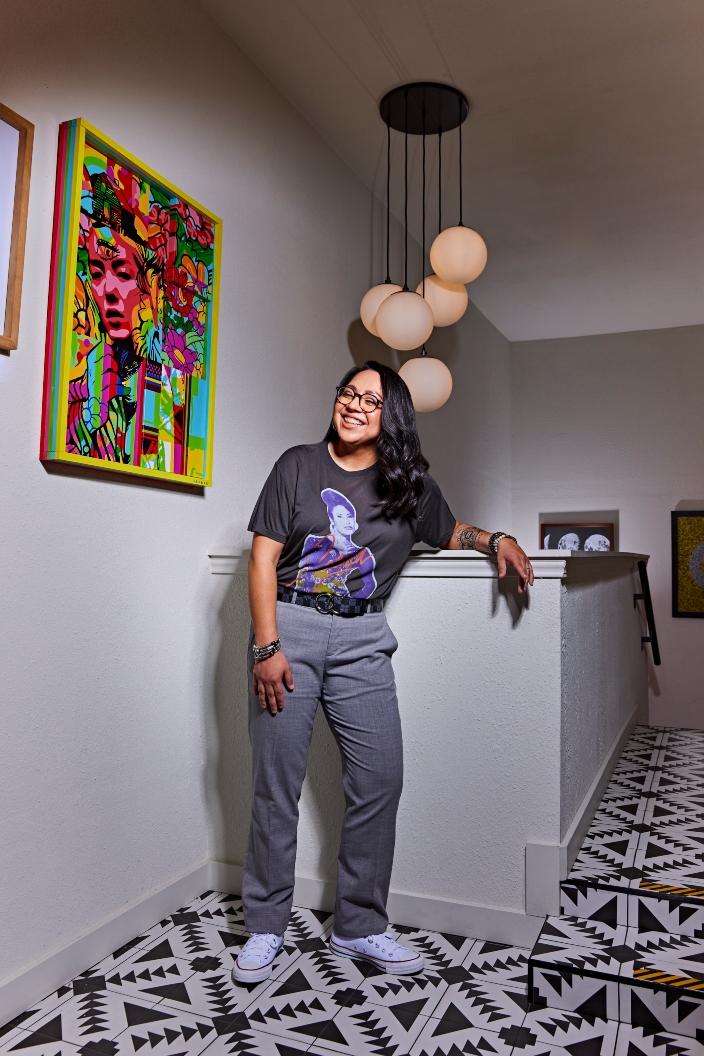
“These conversations are triggering, not only for the people, but it’s triggering also for people who aren’t ready to have those conversations,” she says. “I do a lot of reading on how to stay grounded and how to navigate conflict. I’m a big fan of adrienne maree brown. She has a book called Emergent Strategy. Essentially she talks about how we should turn to nature’s systems as a way to kind of guide us and how we live in space that is recognizing our wholeness. There’s a line that says, ‘Conflict can be generative.’ I feel like so much of what we’re taught is that conflict is bad and that conflict doesn’t provide a positive path. But I’ve learned that we should embrace conflict, because it’s a part of life, right?
“Conflict is a part of who we are, but if we change our perspective on conflict and view it as an opportunity to grow and to learn and to find solutions, then I think we really can begin to navigate space in a way that’s more equitable. We have a lot of conflict in our systems, and those are there because we have a real history of racism and oppression. Until we acknowledge that and see that the conflict has to happen, these hard conversations have to happen. I navigate with that statement, ‘conflict can be generative’; I use it in everyday practice because in these moments of training, I’m dealing with a lot of conflict, but I remind them that this is for you to understand and to see a different lived experience outside your own.”
Making her way on the campaign trail for judge of Travis County certainly tested her mettle, forcing her to commit with her whole chest and speak her truth. Navigating that political space as a queer woman of color ain’t easy, especially for someone who refuses to hide who she is.
“I did freak out. I just freaked out around people who were safe,” she admits with a smile. “There’s still a lot of space that is not very inclusive for LGBTQ individuals, even though people claim to be. So that was a really, really scary moment, where I constantly had to say, ‘Am I about to say that I’m an openly gay woman?’ I said, ‘Hell yeah, I’m about to say that!’” she exclaims, following it with that hearty laugh of hers. “I’m not hiding any bit of myself in these spaces.”
The night of the election was a moment of great pride for both Denise and Krista. “When she said she was ready to run for the bench I stood beside her,” Krista says. When Denise finally found out she’d won, everything seemed to click into place. It was all worth it. “We hugged for 20 seconds just soaking in all the love, joy and cheers surrounding us as her friends and family celebrated,” she says. “I was so proud of her. Running for office is definitely one of the top three hardest things she has ever done and we have ever endured together as a couple. To see her get to the other side of it surrounded by so much love was a marvelous thing.”
“This is so much more than me running for office,” Denise says. “It’s about creating change, representing community; it’s about really, truly making a difference. I think when you focus on a higher purpose, the small things don’t matter as much; the drama doesn’t matter as much.
“I think the biggest thing I shared on the campaign trail that I’ll continue to share is we need leaders who are reflective of lived experience. Who are representative of the communities they serve, who get what it means to be marginalized by a system, to be able to address those issues. But most importantly, [we need]a leader who understands that they are just a representative of the community. One leader is not the solution for all of our social issues, but one leader can help gather and bring collective action and uplift a community to address social issues.
“The other thing [is]welcoming accountability to its core. Allow people to hold you accountable, put your feet to the fire. If you have people who are upset with you—this goes back to conflict as generative—allow yourself to be held accountable. Because we have to focus on the changes that the community wants to see.”
Hustling for Change
Denise and her wife have continued to show up with intention to everything they do together. From their organizations to their businesses, they pour so much of themselves into the community. Their creation of Hustle for the Cause was in direct response to former president Donald Trump’s election in 2016. Much of the language surrounding that presidency centered on xenophobia, separatism and creating chaos and fear among those who don’t fit a certain “great American” ideal.
“That was very concerning,” Denise says. “As an openly gay woman, as a daughter of an immigrant, a lot of things were said that made me feel very unsafe when he got elected. The same thing for my wife. My wife is a Black woman, an openly gay Black woman. There was just a lot of fear that we had in that moment. I cried, I was devastated,” she admits. “But the next morning, my wife and I started talking about safe spaces. What does that mean, and how do we create safe space in our community for people like us, for queer women of color? So we thought, ‘Okay, well, why don’t we support Black and Brown-led grassroots nonprofits that don’t typically get a lot of foundation funding? How do we do that in a fun way?’”
The couple began their community work as more of an event production company with Counter Balance ATX, a nonprofit geared toward connecting Black women to life-saving resources. Their first ’90s hip-hop night at Antone’s was a way to highlight Black creatives and Black art. They followed this event with a collaboration with Good Fight Fitness on a domestic violence awareness event featuring Kalu James and The Electric Joint.
“It eventually led us to Chingona Fest in 2018,” she says with a deep smile. “I was having a conversation with friends and with my wife around creating a space where in support of local Latinx entrepreneurs, you could purchase clothes, hats that were very specific to cultural identity, while also raising money for Latinx-led nonprofits. We continue to do it every year. Now Chingona Fest is our main staple of Hustle for the Cause.”
Obviously the pandemic forced the couple to shift their focus. At the time Denise was doing work at the special victims unit, so Krista invested most of her time in building up their shared consulting business. “[Krista] was doing a lot of consulting with businesses to help them create social impact initiatives. This is where we begin helping people build partnerships with small businesses and small initiatives that could raise money and give grants outright.”
Denise’s time on the campaign trail forced her to take a step back from Hustle for the Cause, focusing solely on Chingona Fest as she campaigned. That didn’t stop her from supporting her wife in their latest venture, Wedding Party Love, a wedding planning business for queer couples they launched right before the pandemic hit.
“How many queer women of color are out there planning weddings?” Denise muses. “There aren’t a lot, especially in Austin. When we were planning our wedding, we actually had a really hard time. We talked to some venues in Central Texas that essentially said they wouldn’t hold a gay wedding. That was when we were planning our wedding in 2018; that’s not that long ago, you know. We also had a lot of vendors who assumed that we were friends and not the couple about to get married. So my wife is like, ‘I’m gonna go and start this,’ and I was very supportive and helping with that. I’m a co-owner, but it really is my wife constantly trailblazing and me just being supportive, cheering her on.”
“Denise does a marvelous job of letting others shine,” Krista says. “When we work on projects together I know that she will let me shine in the areas I thrive in. I know her ego will never be at play when making business decisions, and I know that she’s constantly doing the work to be the best leader she can be. I’m proud of her every single day,” she continues. “She shows up in a way that pushes the people around her to be better. I’m a better person because of her. I look at her with this awe of like, ‘Wow, you’re truly such an amazing human.’”
Human. Denise Hernández is many things: daughter, sister, wife. Judge-elect, advocate, entrepreneur, mentor. But at the end of her time on this earth, the only label that will really matter is human. This humanity is what draws people to her, makes people believe her when she speaks.
“One of Denise’s greatest fears is that she isn’t a good person, or at least not good enough,” Krista reveals. “I want her to know that she’s enough. Denise, you are a good person. You are the best person I know. Your existence has made life-changing impacts on many of the people around you. Keep using that force inside of you for good. I love you.”


